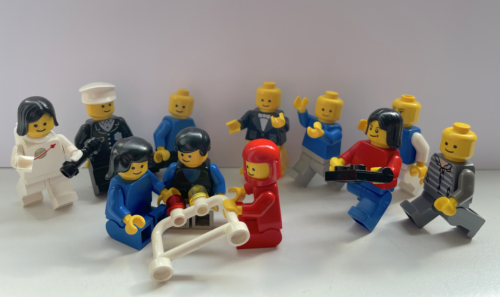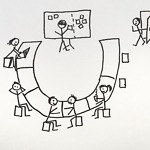
It seems like yesterday when you were three people working in a garage. Now you are an employer of 20 people. Meetings become longer, suddenly you need to deal with more than just one team and not everybody just naturally knows about everything that is going on. Suddenly, there is a talk about "leaders" or even "management" and "processes". How can we successfully scale our organization?
Many growing startups want to maintain their "family spirit" and communication at eye level. How do we create structures that support scaling without too much bureaucracy? Can we remain agile and unique as a growing company? How do we design leadership the way we want it to be, but also in a way that works in a scaling organization? Pragmatic processes, roles, and authentic leadership should be carefully built, supported, and continually reviewed. Inspirations from modern leadership concepts or agile frameworks can be useful to consider.
Promoting a Sustainable Organizational Culture
To develop an organization means to create structures and processes in a way to support a sustainable culture. Newly minted leaders might need training, and to support them in their daily business maybe also coaching. Other things to consider in developing an unique culture might be:
- Meetings: Supporting effective meetings and designing your unique information flow.
- Decision Making: Supporting efficient decision making processes and a culture of shared leadership.
- Collaboration: Supporting the collaboration of divisions, organizations and teams.
- Leadership: Supporting shared commitment, self-organization and responsibility as well as building a modern leadership culture.
How Does Coaching Support Scaling an Organization?
Together with you we would first determine the main issues with which we would start. Afterwards, we define the participants for the workshops. In most cases, the method of choice is iterative (agile). Together we define the first workshop, evaluate the results and first then decide on what to work on next and on the best method to proceed.
It is crucial that the workshops always result in defined tasks or experiments, with the name of the responsible person attached to it. This ensures that the workshop actually has an impact on the future and that you get real learningsto use also in future coaching. Working "on the system" in this way is challenging, but often still very much fun!
Why Not Just Use "Agile Coaching"?
Agile is a concept popular with many organizations. However, it is often hard to get it right or even meaningful in actual implementation (a fact I know all-too-well from my own experience). In Agile Coaching, too, I use a pragmatic approach starting with what it actually is that you want to achieve. Finding out what is already working and what does not need to change is an important step. Afterwards, we can choose suitable building blocks from Agile frameworks that make sense in your specific context and situation. What has brought success to Spotify is not necessarily also the best approach for the situation of a Swiss IT SME. Here you can read more about how I see my consulting to be different from or complementary to "classical" Agile Coaching.
However, it can be very inspiring to look at different current theories and "agile" models: Scrum, Sociocracy, Holacracy, Teal (Laloux), Distributed Leadership and Management 3.0 present different approaches to solving different problems. My coaching and consulting can help you find your way around these many concepts and stay focused on what it is you really need for your company. And then also support you in implementing them in a way that fits your situation and your envisaged future.
Blog posts Related to "Scaling Organizations Successfully" (in German)
 Leadership-Unterstützung im Startup: 3 Fallen und wie man sie vermeidet - Leadership-Unterstützung gehört im Startup meist nicht zu den brennenden Themen auf der Agenda. Es lohnt sich aber, es frühzeitig anzugehen und zwei weitere wichtigste Fallen zu vermeiden: fehlender Trainer-Fit und zuwenig Zeit.
Leadership-Unterstützung im Startup: 3 Fallen und wie man sie vermeidet - Leadership-Unterstützung gehört im Startup meist nicht zu den brennenden Themen auf der Agenda. Es lohnt sich aber, es frühzeitig anzugehen und zwei weitere wichtigste Fallen zu vermeiden: fehlender Trainer-Fit und zuwenig Zeit. Die Nicht-Lernende Organisation: Was Firmen am Lernen hindert - Viele Organisationen investieren einiges ins Lernen. Sie schicken MitarbeiterInnen gezielt in Trainings und bauen ihr Knowledge-Management aus. Einige halten "Lessons Learnt"-Meetings ab, arbeiten in agilen Frameworks oder organisieren sogar "Fuck-up-Nights". Alles Massnahmen, die das Lernen der Organisation tatsächlich fördern können. Leider gibt es aber auch einige Dinge, welche das organisationale Lernen aktiv hindern. Zwei davon sind ungünstige Feedback-Praktiken und Rituale der Problemvermeidung.
Die Nicht-Lernende Organisation: Was Firmen am Lernen hindert - Viele Organisationen investieren einiges ins Lernen. Sie schicken MitarbeiterInnen gezielt in Trainings und bauen ihr Knowledge-Management aus. Einige halten "Lessons Learnt"-Meetings ab, arbeiten in agilen Frameworks oder organisieren sogar "Fuck-up-Nights". Alles Massnahmen, die das Lernen der Organisation tatsächlich fördern können. Leider gibt es aber auch einige Dinge, welche das organisationale Lernen aktiv hindern. Zwei davon sind ungünstige Feedback-Praktiken und Rituale der Problemvermeidung. Wie kann ich führen, ohne autoritär zu wirken? - Die Idee von "oben und unten" wirkt auf viele Führungkräfte etwas altmodisch. Wieviel Autorität ist nötig, wieviel Mitbestimmung möglich? Kann ich als Führungskraft KollegIn bleiben? Moderne Führung ist komplex, kann aber auch gestaltet werden.
Wie kann ich führen, ohne autoritär zu wirken? - Die Idee von "oben und unten" wirkt auf viele Führungkräfte etwas altmodisch. Wieviel Autorität ist nötig, wieviel Mitbestimmung möglich? Kann ich als Führungskraft KollegIn bleiben? Moderne Führung ist komplex, kann aber auch gestaltet werden. Entscheidungen im Team ohne endlose Quasselrunden - Entscheiden im Team hat den Vorteil, dass es nachhaltigere Lösungen gibt, die von allen mitgetragen werden. Wie kann ich aber im Team entscheiden, ohne dass es in endlose Diskussionen ausartet? Erfahren Sie in diesem Beitrag, welche Strukturen dies erleichtern können.
Entscheidungen im Team ohne endlose Quasselrunden - Entscheiden im Team hat den Vorteil, dass es nachhaltigere Lösungen gibt, die von allen mitgetragen werden. Wie kann ich aber im Team entscheiden, ohne dass es in endlose Diskussionen ausartet? Erfahren Sie in diesem Beitrag, welche Strukturen dies erleichtern können. Selbstorganisation: Sinnvoll oder Hype? - Selbstorganisation entsteht in Organisationen von alleine, aber möglicherweise nicht die Art von Selbstorganisation die man will. Erfahren Sie, wie man Selbstorganisation fördert und welche Voraussetzungen dafür wichtig sind.
Selbstorganisation: Sinnvoll oder Hype? - Selbstorganisation entsteht in Organisationen von alleine, aber möglicherweise nicht die Art von Selbstorganisation die man will. Erfahren Sie, wie man Selbstorganisation fördert und welche Voraussetzungen dafür wichtig sind. Im U, per Du: Was Meetings über die Unternehmenskultur verraten - Die Unternehmenskultur prägt einerseits das Verhalten der Menschen in einer Organisation. Andererseits wird die Kultur auch täglich neu von den MitarbeiterInnen durch ihre Handlungen definiert und vermittelt. Meetings sind ein gutes Beispiel dafür. Lernen Sie in diesem Beitrag anhand der Meetings Ihre Organisationskultur genauer kennen und experimentieren Sie mit ein paar "Hacks", um diese direkt zu beeinflussen.
Im U, per Du: Was Meetings über die Unternehmenskultur verraten - Die Unternehmenskultur prägt einerseits das Verhalten der Menschen in einer Organisation. Andererseits wird die Kultur auch täglich neu von den MitarbeiterInnen durch ihre Handlungen definiert und vermittelt. Meetings sind ein gutes Beispiel dafür. Lernen Sie in diesem Beitrag anhand der Meetings Ihre Organisationskultur genauer kennen und experimentieren Sie mit ein paar "Hacks", um diese direkt zu beeinflussen.